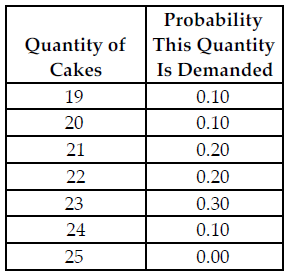A recent study showed that an increase in the price of gasoline promoted carpooling among office commuters. If gasoline is an important component in the fixed basket of goods used to calculate the Consumer Price Index, it will fail to reflect true changes in the cost of living of an average consumer because of the:
a. quality bias
b. substitution bias.
c. new good bias.
d. quantity bias.
b
You might also like to view...
Your economics professor has decided that your class will not be graded on a curve but on an absolute scale. Therefore, it is possible for every student in the class to get an "A
" Your grade will not depend in any way on your classmates' performance. Based on this information, you decide that you should study economics three hours each day, regardless of what your classmates do. In the language of game theory, your decision to study three hours each day is: A) a dominant strategy. B) a minimax strategy. C) a maximin strategy. D) a Prisoner's dilemma.
Producer surplus in a perfectly competitive industry is
A) the difference between profit at the profit-maximizing output and profit at the profit-minimizing output. B) the difference between revenue and total cost. C) the difference between revenue and variable cost. D) the difference between revenue and fixed cost. E) the same thing as revenue.
Refer to the table below. Busy Betty sells her cakes for $20 each and her constant marginal cost to produce each cake is $12, which is equal to her (constant) average total cost. If she does not sell a cake the day she makes it, she sells it as day-old cake for $10. What is her expected marginal cost of holding the 22nd cake in inventory?

The above table shows the probability distribution of cake sales at Busy Betty's Bakery.
A) $0.40
B) $1.20
C) $0.80
D) $2.00
Which of the following policy actions shifts the aggregate-demand curve?
a. an increase in the money supply b. an increase in taxes c. an increase in government spending d. All of the above are correct.